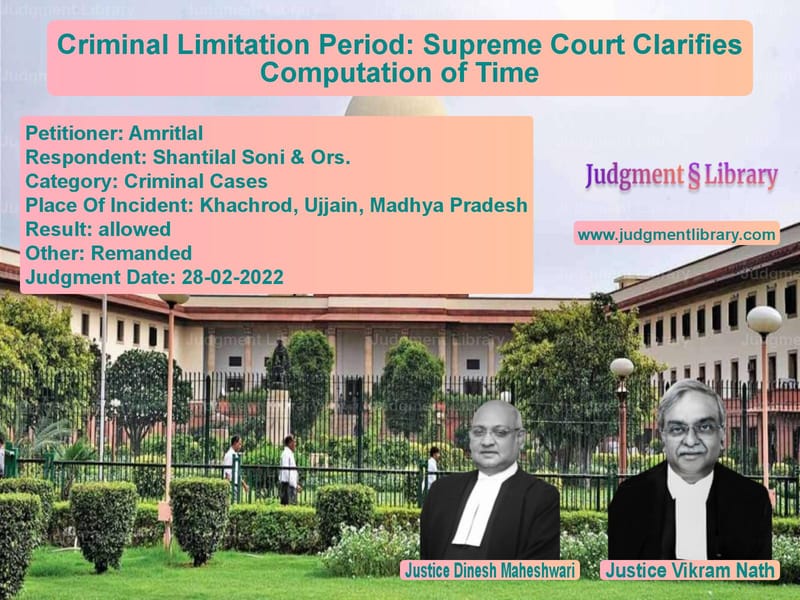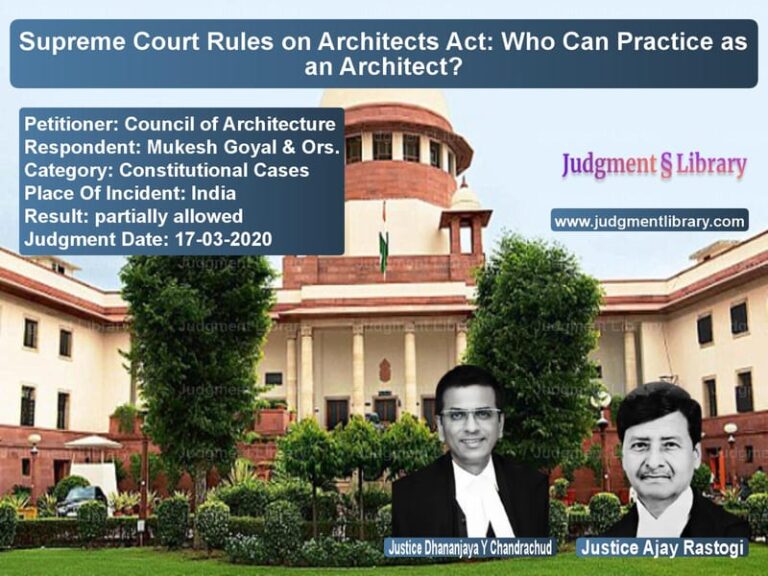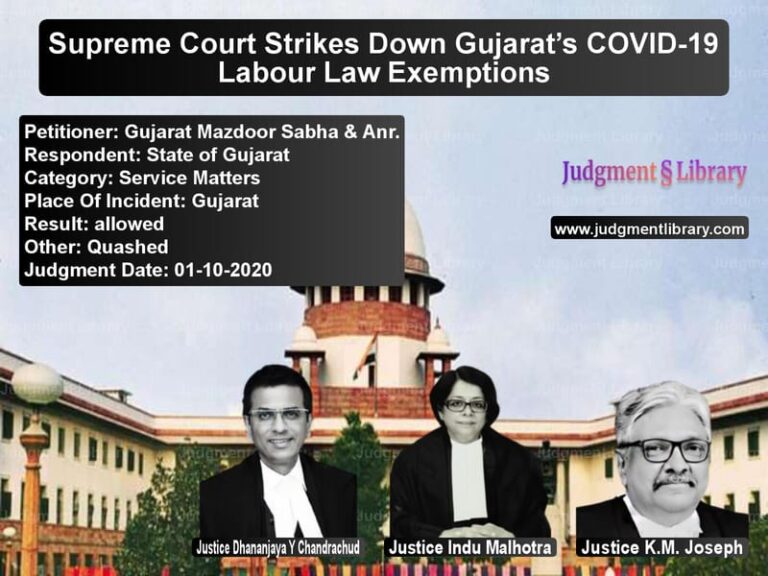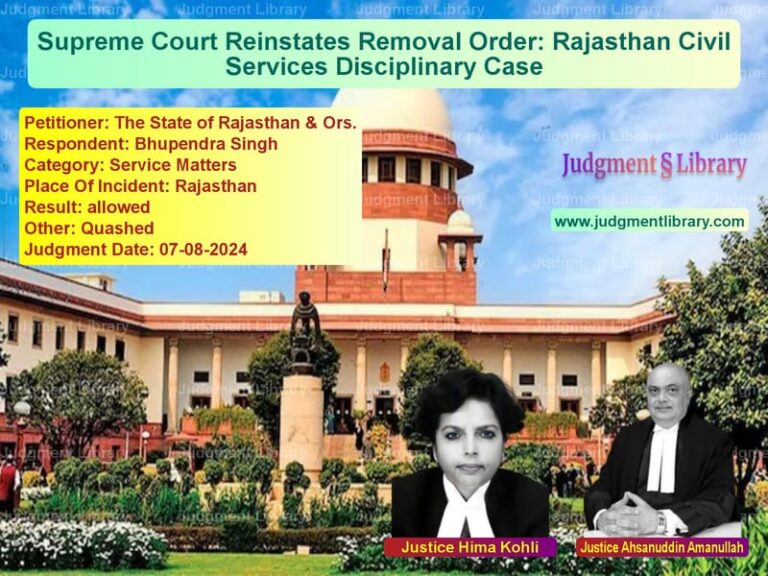Criminal Limitation Period: Supreme Court Clarifies Computation of Time
The Supreme Court of India recently delivered an important judgment in Amritlal vs. Shantilal Soni & Ors., clarifying the correct approach to calculating the limitation period for criminal cases under the Criminal Procedure Code, 1973 (CrPC). The case revolved around whether the limitation period should be counted from the date of filing the complaint or from the date on which the Magistrate takes cognizance of the offence.
Background of the Case
The case originated from a written complaint filed by Amritlal on 10.07.2012 with the Superintendent of Police, Khachrod, alleging that the respondent, Shantilal Soni, had refused to return 33.139 kg of silver entrusted to him on 04.10.2009. Based on this complaint, an FIR (No. 289 of 2012) was registered, and after investigation, a charge sheet was filed on 13.11.2012 for offences under Section 406 read with Section 34 and Section 120-B of the Indian Penal Code (IPC). The Judicial Magistrate, First Class, Khachrod, took cognizance of the matter on 04.12.2012.
However, the accused challenged this decision, arguing that taking cognizance was time-barred since the complaint was filed more than three years after the alleged offence. The Trial Court and Additional Sessions Judge dismissed these objections, affirming that the prosecution was valid.
Aggrieved, the accused approached the Madhya Pradesh High Court, which ruled in their favor, holding that the limitation period should be calculated from the date of the offence (04.10.2009), and since the Magistrate took cognizance only on 04.12.2012—more than three years later—the proceedings were time-barred. The complainant then appealed to the Supreme Court.
Petitioner’s Arguments
- The petitioner argued that the limitation period under Section 468 of CrPC should be calculated from the date of filing the complaint (10.07.2012), not the date on which the Magistrate took cognizance.
- It was contended that the High Court erred by assuming that the limitation period is calculated from the date of cognizance instead of the date of complaint filing.
- The petitioner relied on the Supreme Court’s Constitution Bench ruling in Sarah Mathew v. Institute of Cardio Vascular Diseases [(2014) 2 SCC 62], which held that limitation is to be computed from the date of filing the complaint, not the date of cognizance.
Respondents’ Arguments
- The respondents maintained that the proceedings were barred by limitation since the alleged offence occurred on 04.10.2009, and the Magistrate took cognizance only on 04.12.2012, more than three years later.
- They relied on the Supreme Court’s ruling in State of Punjab v. Sarwan Singh [(1981) 3 SCC 34] to argue that once the limitation period has expired, the prosecution cannot be maintained.
- They also contended that the ruling in Sarah Mathew required reconsideration as it allegedly did not fully address the legislative intent behind limitation provisions in criminal law.
Supreme Court’s Judgment
The Supreme Court overturned the High Court’s ruling and reinstated the criminal proceedings. The Court ruled:
- The High Court erred in assuming that the limitation period starts from the date of cognizance (04.12.2012) instead of the date of filing the complaint (10.07.2012).
- The Constitution Bench in Sarah Mathew had already settled this issue, holding that the limitation period is calculated from the date of filing the complaint or institution of prosecution, not from the date the Magistrate takes cognizance.
- The ruling in State of Punjab v. Sarwan Singh was not applicable, as it did not deal with the computation of limitation under CrPC.
- Since the complaint was filed on 10.07.2012, within the three-year limitation period from the date of offence (04.10.2009), the prosecution was valid.
Key Excerpts from the Supreme Court Judgment
The Supreme Court stated:
“For the purpose of computing the period of limitation under Section 468 CrPC, the relevant date is the date of filing of the complaint or the date of institution of prosecution and not the date on which the Magistrate takes cognizance.”
The Court further emphasized:
“The High Court has made a fundamental error in assuming that the date of taking cognizance (04.12.2012) is decisive of the matter, while ignoring the fact that the written complaint was indeed filed by the appellant on 10.07.2012, well within the period of limitation of three years with reference to the date of commission of offence (04.10.2009).”
Final Verdict
The Supreme Court allowed the appeal and reinstated the criminal proceedings, directing the Trial Court to proceed with the trial. The Court also warned the accused against any attempts to delay the trial, stating:
“If any other attempt is made on part of the accused-respondents to delay or obstruct the trial, the Magistrate would be free to adopt such coercive proceedings as may be necessary, including cancellation of bail granted to the accused-respondents or putting monetary conditions on them, equivalent to the present value of the property involved in the matter.”
Conclusion: Implications of the Judgment
This judgment has significant implications:
- It reaffirms that the limitation period for criminal cases under Section 468 CrPC is to be computed from the date of filing the complaint, not from the date of cognizance.
- It upholds the authority of the Constitution Bench ruling in Sarah Mathew, ensuring consistency in legal interpretation.
- It prevents accused persons from using procedural technicalities to evade prosecution by delaying cognizance.
- The judgment provides clarity for law enforcement agencies and courts in handling cases where limitation is questioned.
By reinforcing a consistent approach to criminal limitation periods, this ruling strengthens the legal framework and ensures that justice is not denied due to procedural misinterpretations.
Petitioner Name: Amritlal.Respondent Name: Shantilal Soni & Ors..Judgment By: Justice Dinesh Maheshwari, Justice Vikram Nath.Place Of Incident: Khachrod, Ujjain, Madhya Pradesh.Judgment Date: 28-02-2022.
Don’t miss out on the full details! Download the complete judgment in PDF format below and gain valuable insights instantly!
Download Judgment: amritlal-vs-shantilal-soni-&-ors-supreme-court-of-india-judgment-dated-28-02-2022.pdf
Directly Download Judgment: Directly download this Judgment
See all petitions in Fraud and Forgery
See all petitions in Money Laundering Cases
See all petitions in Attempt to Murder Cases
See all petitions in Extortion and Blackmail
See all petitions in Theft and Robbery Cases
See all petitions in Judgment by Dinesh Maheshwari
See all petitions in Judgment by Vikram Nath
See all petitions in allowed
See all petitions in Remanded
See all petitions in supreme court of India judgments February 2022
See all petitions in 2022 judgments
See all posts in Criminal Cases Category
See all allowed petitions in Criminal Cases Category
See all Dismissed petitions in Criminal Cases Category
See all partially allowed petitions in Criminal Cases Category







